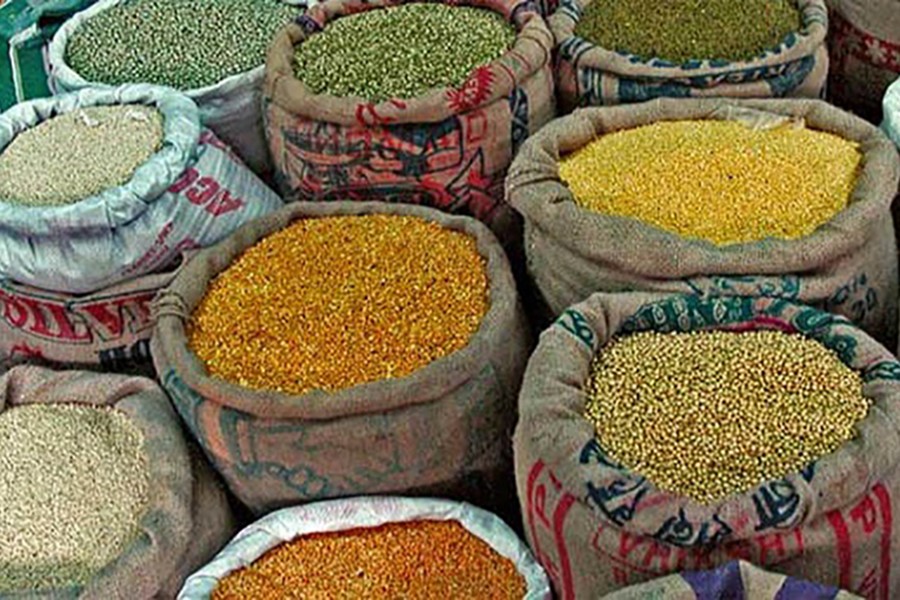Pulses import rises amid static local output
Experts for providing incentives to encourage domestic production

Published :
Updated :

The local production of pulses almost remained static in last five years, causing a rise in imports of the essential item to meet the growing demand.
The rise in imports is affecting the interests of consumers as the big importers and traders are taking advantage to fix the prices at their will, said market experts.
They suggested boosting domestic production through incentivising the farmers.
The production of different kinds of pulses in the country reached 0.38 million tonnes in the financial year 2017-18 (FY '18) from 0.36 million tonnes five years back.
Of the production in FY'18, lentil was 0.17 million tonnes, kheshari (L sativus), 0.11 million tonnes, mung bean (moog) 0.03 million tonnes, mashkalai (black-gram) 0.04 million tonnes.
Only lentil output increased to some extent while mung, khesari and chickpea (gram) witnessed a decline during the period. The production of other sorts of pulses including mashkalai and motor (green pea) remained static.
Arhar, one of the most fragrant pulses in the world, almost disappeared from the country - Bangladesh Bureau of Statistics (BBS) found only 465 tonnes of the pulse grown in few districts last year.
The BBS is yet to publish the primary estimates of the pulses production in the FY'19.
An official at the Agri Wing of BBS said production of pulses is likely to decline slightly amid adverse climatic condition during the cultivation period in Jashore and Khulna regions, the main pulse-growing hub.
The import of pulses increased to 0.75 million tones, including lentil 0.43 million tonnes and gram 0.18 million tonnes, in FY'18 from 0.58 million tonnes in FY '14, according to the Ministry of Commerce (MoC).
The country imports lentils and gram (chickpea) of different qualities in a large volume mainly from Australia, Canada, Nepal and India.
"Lentil is now the most consumed pulses, followed by gram and kheshari," said T M Rashed Khan, assistant director at the state-run Department of Agricultural Marketing (DAM).
He said the demand for gram usually increases by twenty folds during the holy month of Ramadan.
Despite getting lucrative price offers, he said, the farmers are not interested in farming pulses like lentil and moog as the crops are sensitive to adverse weather condition.
"And, the output of the easy-to-grow 'khesari' species has gradually been shrinking for decades amid fear of lethargic disease," he said.
Khesari was a major food item in the country's northwestern and southwestern parts where commoners ate bread made of pulses, he said.
He said the trend has changed over the last two decades thanks to the hike in rice production.
Vice president of Bangladesh Agricultural Economists Association (BAEA) Prof Golam Hafeez Kennedy said the country needs 1.45 million tonnes of pulses annually, considering its population of 170 million.
He said the demand has been increasing at 12-15 per cent year-on-year while the production remained static for last half decade.
"Demand for local lentil, most of which is finer, is much high; but the shortage is met through imports from neighbouring Nepal," he said.
Prof Kennedy said the total pulses market is dominated by big importers and their allied traders in Chattogram and Dhaka.
He said the production cost of local lentil would be maximum Tk 40 a kg when we have to buy it at a minimum of Tk 100 a kg.
The country has to increase cultivation area for pulses from the present 0.4 million hectares to 1.0 million hectares to reduce dependence on imports, he said.
Farmers should be encouraged through providing cash incentives, loan at zero interests and quality seeds, he said.
Noakhali, Khulna, Kushtia, Jashore, Rajshahi, Fardipur, Dinajpur and Dhaka regions should be prioritised for pulses farming, he added.
Prices of different pulses, however, increased in the city markets by 3.0 to 22 per cent in last one month, according to the Trading Corporation of Bangladesh (TCB).
Finer lentil (both local and Nepalese) was selling at Tk 120-140 a kg, coarse lentil (imported) at Tk 70-82, gram at Tk 78-88 and mung bean Tk 130-150 a kg.
The current prices are 14-27 per cent higher now than that of a year ago.
tonmoy.wardad@gmail.com


 For all latest news, follow The Financial Express Google News channel.
For all latest news, follow The Financial Express Google News channel.